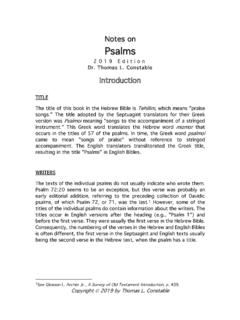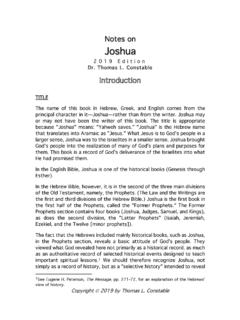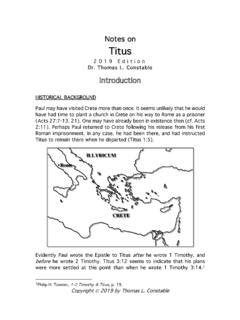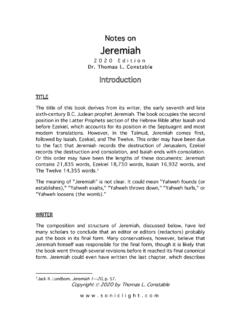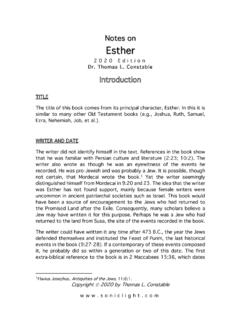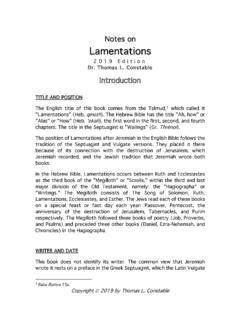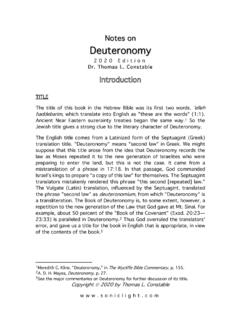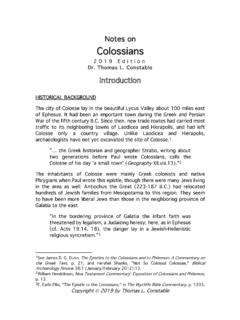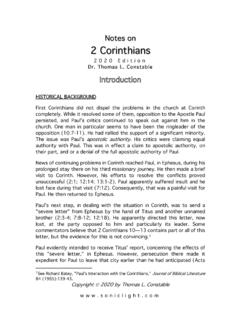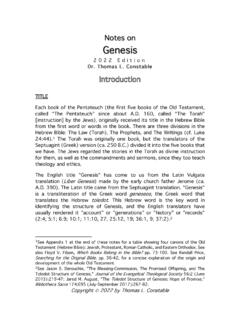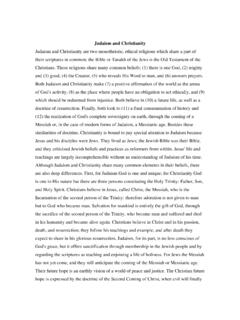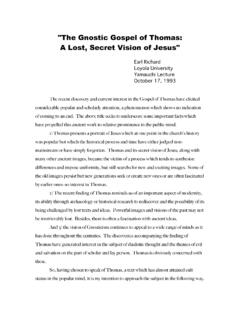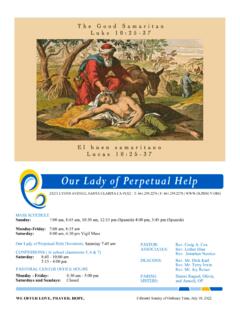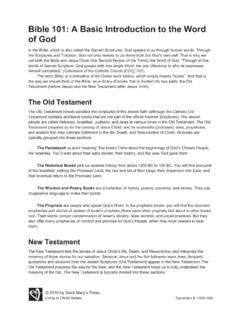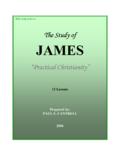Transcription of Notes on Mark - Plano Bible Chapel
1 Copyright 2023 by Thomas L. Constable Notes on Mark 2023 Edition Dr. Thomas L. Constable TITLE "The title, 'According to Mark' (.. [kata Markon]), was probably added when the canonical gospels were collected and there was need to distinguish Mark's version of the gospel from the others. The gospel titles are generally thought to have been added in the second century but may have been added much earlier. Certainly we may say that the title indicates that by 125 or so an important segment of the early church thought that a person named Mark wrote the second gospel ."1 WRITER The writer did not identify himself by name anywhere in this This is true of all four Gospels. There are many statements of the early church fathers that identify the "John Mark" who is frequently mentioned in the New Testament as the writer (cf.)
2 Acts 12:12, 25; 13:5, 13; 15:36-39; Col. 4:10; Phile. 24; 2 Tim. 4:11; 1 Pet. 5:13; et al.). The earliest reference of this type is in Eusebius' Ecclesiastical History (ca. 326).3 Eusebius quoted Papius' Exegesis of the Lord's Oracles (ca. 140), a work now lost. Papius quoted "the Elder," probably the Apostle John, who said the following things about this gospel : Mark wrote it, though 1 Donald A. Carson and Douglas J. Moo, An Introduction to the New Testament, p. 172. See ibid, pp. 726-43 for a brief discussion of the formation of the New Testament canon. 2In these Notes I have capitalized " gospel " when I refer to a book of the Bible and have used lowercase " gospel " when referring to the gospel message. 3 Eusebius, The Ecclesiastical History of Eusebius Pamphilus, 2:15:64-65, 3:39:124-27. 2 Dr. Constable's Notes on Mark 2023 Edition he was not a disciple of Jesus during Jesus' ministry or an eyewitness of Jesus' ministry.
3 He accompanied the Apostle Peter and listened to his preaching. He based his gospel on the eyewitness account and spoken ministry of Peter. Mark did not write his gospel in strict orderly sequence, meaning either chronological order1 or rhetorical and artistic order2, but he recorded accurately what Peter remembered of Jesus' words and deeds. He considered himself an interpreter of Peter's By this, "the Elder" probably meant that Mark recorded the teaching of Peter for the church, though not necessarily verbatim, as Peter expressed Finally, "the Elder" said that Mark's account is wholly reliable. Another important source of the tradition that Mark wrote this gospel is the Anti-Marcionite Prologue to Mark ( 160-180). It also stated that Mark received his information from Peter.
4 Moreover, it recorded that Mark wrote after Peter died, and that he wrote this gospel in Irenaeus (ca. 180-185), another early church father, noted that Mark wrote after Peter and Paul had Other early tradition documenting these facts comes from Justin Martyr (ca. 150-160), Clement of Alexandria (ca. 195), Tertullian (ca. 200), the Muratorian Canon (ca. 200), and Origen (ca. 230). This testimony dates from the end of the second century. Furthermore it comes from three different centers of early Christianity: Asia Minor (modern Turkey), Rome (in Italy), and Alexandria (in Egypt). Thus there is strong external evidence that Mark wrote this gospel . Mark was evidently a relative of Barnabas, and he accompanied Barnabas and Paul on their first missionary journey, but he left these apostles when they reached Perga.
5 Mark became useful to Paul during Paul's second Roman imprisonment, and was also with Peter when Peter was in Rome. Peter described him as his "son," probably his prot g .7 Eusebius wrote that Mark was "the first that was sent to Egypt, proclaimed the gospel 1 Martin Hengel, "Literary, Theological, and Historical Problems in the gospel of Mark," in Studies in the gospel of Mark, p. 48. 2 Robert A. Guelich, Mark 1 8:26, p. xxvii. 3 Eusebius, 3:39:127. 4 Richard C. H. Lenski, The Interpretation of St. Mark's gospel , p. 12. 5 See F. F. Bruce, The Spreading Flame, p. 139, footnote 6 Irenaeus, Against Heresies, 3:1:2. 7 For a table comparing Peter's address in Acts 10:36-40 and the structure of Mark's gospel , see Carson and Moo, p. 193. 2023 Edition Dr. Constable's Notes on Mark 3 there which he had written, and first established churches at the city of Alexandria.
6 "1 It seems unlikely that the early church would have accepted this gospel as authoritative, since its writer was a secondary figure, without having convincing proof that Mark wrote it. Perhaps Luke showed special interest in John Mark, in Acts, because he was the writer of this gospel , more than because he caused a breach between Paul and "It is evident that he [Mark] was a charismatically endowed teacher and evangelist .. A careful reading of the gospel will serve to introduce the author as a theologian of the first rank who never forgot that his primary intention was the strengthening of the people of God in a time of fiery ordeal."3 DATE The earliest that Mark could have written this gospel , if the testimonies of the Anti-Marcionite Prologue and Irenaeus are correct, was after the death of Peter and Paul.
7 The most probable dates of Peter's martyrdom in Rome are 64-67. Paul probably died as a martyr there in 67-68. However, Clement of Alexandria and Origen both placed the composition of this gospel during Peter's lifetime. This may mean that Mark wrote shortly before Peter died. Perhaps Mark began his gospel during Peter's last years in Rome and completed it after Peter's death. The latest that Mark could have written his gospel was probably 70, when Titus destroyed Jerusalem. Many scholars believe that since no gospel writer referred to that event, which fulfilled prophecy, they all must have written before it. To summarize, Mark probably wrote this gospel sometime between 63 and 70. 1 Eusebius, 2:16:65. 2A. E. J. Rawlinson, The gospel According to St. Mark, p. xxxi. 3 William L.
8 Lane, The gospel according to Mark, p. 23. 4 Dr. Constable's Notes on Mark 2023 Edition ORIGIN AND DESTINATION Most of the early Christian tradition says that Mark wrote his gospel in Italy, and specifically in This external testimony finds support in the internal evidence of the gospel itself. Many indications in the text point to Mark's having written for Gentile readers originally, particularly Romans: He explained Jewish customs that would have been strange to Gentile readers ( , 7:2-4; 15:42). He translated Aramaic words that would have been unfamiliar to Gentiles (3:17; 5:41; 7:11, 34; 15:22). Compared to Matthew and Luke he used many Latinisms and Latin loan words, indicating Roman influence. However, some students of the book believe that Mark wrote from Mark showed special interest in persecution and martyrdom, which would have been of special interest to Roman readers when he wrote ( , 8:34-38; 13:9-13).
9 Christians were then suffering persecution in Rome, and in various other places throughout the empire, especially after Nero began to persecute Christians in 65. For Romans, death by crucifixion was enough to disqualify Jesus as the Savior, and much of what Mark emphasized showed that He did not deserve Finally, the early circulation and widespread acceptance of this gospel among Christians suggest that it originated from, and went to, a powerful and influential "Matthew is directed to the religious man. Mark was written to the strong man. Luke is addressed to the thinking man. The gospel of John is directed to the wretched man, the man who needs salvation."5 CHARACTERISTICS Linguistically, Mark used a relatively limited vocabulary when he wrote this gospel . For example, he used only about 80 words that occur nowhere else 1 Irenaeus, and Clement of Alexandria.
10 , J. Sidlow Baxter, Explore the Book, 5:221. 3 Robert H. Gundry, Mark, p. 1045. 4 Walter W. Wessel, "Mark," in Matthew-Luke, vol. 8 of The Expositor's Bible Commentary, p. 609. 5J. Vernon McGee, Thru the Bible with J. Vernon McGee, 4:163. 2023 Edition Dr. Constable's Notes on Mark 5 in the Greek New Testament, compared with Luke's gospel that contains about 250 such words. Another unique feature is that Mark also liked to transliterate Latin idioms and phrases into Greek ( , centurio [15:39], quadrans [12:42], flagellare [15:15], speculator [6:27], census [12:42], sextarius [7:4], and praetorium [15:6]).1 However, the Aramaic language also influenced Mark's Greek, possibly because Peter spoke Aramaic. Mark included more Aramaic phrases than any of the other gospel writers ( , boanerges [3:17], talitha cumi [5:41], korban [7:11], ephphatha [7:34], and abba [14:36]).
